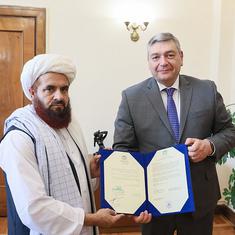Chinmayanand sexual harassment case: HC wonders why woman was silent when ‘virginity was at stake’
The court granted bail to the former Union minister and claimed the case was a ‘complete matter of quid pro quo’.

The Allahabad High Court on Monday granted bail to former Union minister and Bharatiya Janata Party leader Chinmayanand in the alleged sexual harassment case of a law student, reported ANI.
In August, the 23-year-old complainant went missing soon after posting a video detailing her ordeal. Although she did not name anyone, her father named Chinmayanand in a missing-person complaint. On August 27, the police booked Chinmayanand on kidnapping charges. The woman was found in Rajasthan on August 30, and was produced in the Supreme Court. Later in the month, she claimed that she possessed about 35 videos that would implicate the BJP leader.
After the law student accused Chinmayanand of raping her in August, the BJP leader was booked on watered down sexual assault charges but not rape. A rape charge carries a term of seven years extending to life, but Section 376C of the Indian Penal Code – sexual intercourse by a person in authority – comes with a punishment of five to 10 years. Chinmayanand was booked for stalking, wrongful confinement and criminal intimidation.
Days after his arrest, the BJP had said in September that Chinmayanand was no longer with the party.
The bail order
In its order granting bail to the former Union minister, Justice Rahul Chaturvedi said the case was a “complete matter of quid pro quo” and that the woman’s conduct was “astonishing” and she had “tried to blackmail him for ransom”, The Indian Express reported.
Justice Rahul Chaturvedi, in his order, said: “A girl, whose virginity is at stake, not uttering a single word to her own parent or before the court regarding the alleged incident, is an astonishing conduct which speaks volumes about the ingeniousness of the prosecution story.”
“It is also noteworthy there are material on record where the family members of Miss ‘A’ were being benefited out of the solipsistic behavior of the accused applicant,” the order said. “It is also noticeable that there is also nothing on record that during the period of the alleged atrocities committed upon Miss ‘A’ she made any complaint or even any whisper to her family members against the accused applicant.”
So, the court drew to a conclusion that “it was a complete matter of quid pro quo but over a span of time the greed for extracting ‘more’, she along with her accomplices seems to have advanced for hatching a conspiracy against the applicant and tried to blackmail him for ransom, through the obscenic video clips recorded by herself”, Chaturvedi said.
The High Court judge wondered why the woman never shared anything with anyone, including her parents. “On the other hand, during [that] dark period, on her own, purchased a spy-camera fitted goggles, from which she shot nude pictures and recorded videos of the accused, which were used by her in demanding the ransom money from the accused applicant, after blackmailing,” he said in the order.
“What is mind boggling, disturbing and matter of concern is that a student of LL.M., i.e. Miss ‘A’ comes into contact with the applicant, seeks and enjoys his ‘patronage’ and ‘benevolence’ as well as on her family members and in lieu of that she was said to be exploited physically by the applicant, keeps mum throughout the entire long period for almost nine to 10 months,” the court added.
It also asked if it was “difficult to decipher as to who has used whom”.
Questioning the relationship between the woman and her father, the court said: “The relationship between father and the daughter seems to be quite strange as they were having no direct contacts and were alien to each other and the father was taking stock of the situation of his daughter through her Facebook account.”
The judge mentioned that Chinmayanand “once adorned the post of state minister for internal affairs in the Government of India” and that he had gotten involved in a “most discreet incident and that too for a considerable period of time”.
The woman’s statement that was made before a magistrate “contains almost same flavour and texture with certain modifications hither and thither” as her remarks to the police, the judge added.









